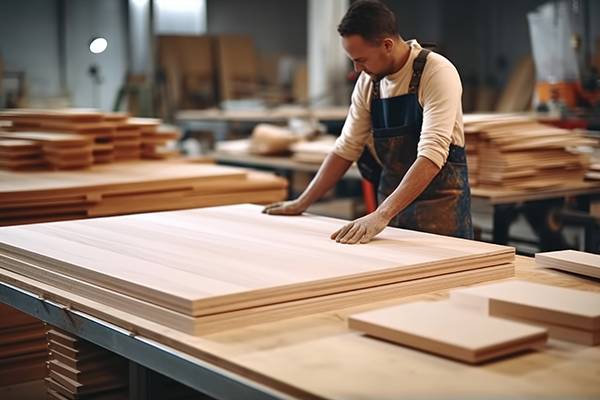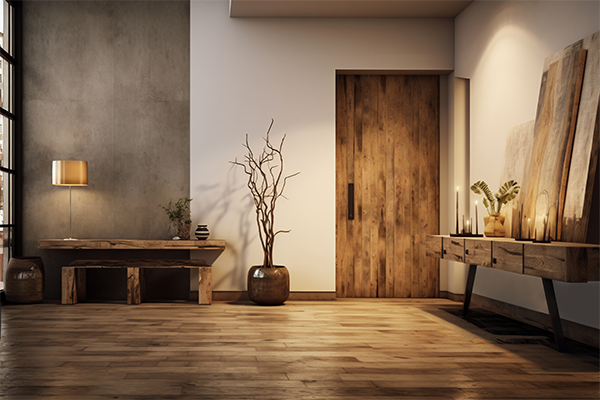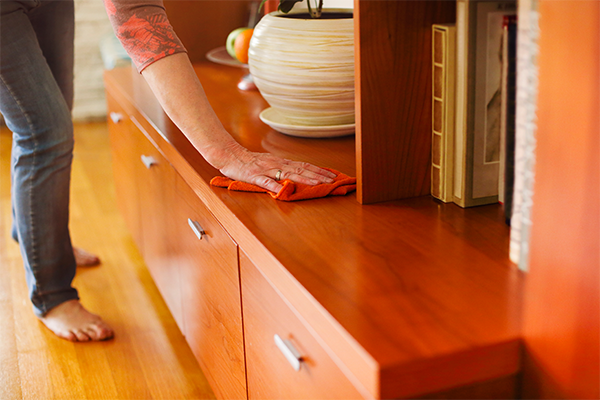What is Plywood?

About Plywood - PATIDAR Doors
Plywood is a versatile engineered wood product composed of thin layers of wood veneers glued together. These layers, known as plies or veneers, are stacked in alternating grain directions to enhance strength and stability. The result is a robust and dimensionally stable panel suitable for a wide range of applications.
Manufacturing Process of Plywood
Log Selection: The plywood manufacturing process begins with the careful selection of logs, typically softwood or hardwood species. Logs are chosen based on their quality, size, and intended application.
Peeling or Slicing: Once selected, the logs undergo peeling or slicing to create thin veneer sheets. Peeling involves rotating the log against a blade to produce continuous veneers, while slicing utilizes a stationary blade to cut the log into individual sheets.
Drying: The veneer sheets are then dried to remove excess moisture, ensuring dimensional stability and preventing warping or delamination in the finished product.
Sorting and Grading: After drying, the veneer sheets are sorted and graded based on their quality, thickness, and appearance. Higher-grade veneers are used for premium plywood products, while lower-grade veneers may be utilized in structural or industrial applications.
Gluing: The selected veneer sheets are glued together using adhesives, typically phenol formaldehyde or urea formaldehyde resins. The adhesive ensures strong bonding between the layers and provides moisture resistance.
Pressing: Once glued, the veneer sheets are stacked together and placed in hydraulic presses. Pressure and heat are applied to compress the layers and cure the adhesive, resulting in a solid and stable plywood panel.
Sanding and Finishing: After pressing, the plywood panels undergo sanding to achieve a smooth surface finish. Additional finishing treatments, such as staining or coating, may be applied based on the desired aesthetic and functional requirements.
What is Plywood Used For?
Plywood serves as a versatile building material with a multitude of applications. From construction projects such as roofing, flooring, and walls to furniture making, interior design, and packaging, plywood finds its place in various industries. It is also indispensable in transportation for vehicle interiors and marine vessels due to its strength and durability. Additionally, plywood is favored in DIY projects for its ease of use and affordability. Its adaptability makes it suitable for both residential and commercial applications, showcasing its widespread utility in modern construction and design.
Types of Plywood Offered by PATIDAR Doors
Commercial Plywood: Suitable for a wide range of interior and exterior applications, commercial plywood offers versatility and affordability, making it ideal for furniture, cabinetry, and general construction projects.
Fire Plywood: Engineered with fire-resistant properties, fire plywood provides enhanced safety in high-risk environments. It is commonly used in fire-rated doors, partitions, and structural elements where fire protection is paramount.
Marine Plywood: Designed to withstand moisture and humidity, marine plywood is ideal for marine and outdoor applications. Its superior water resistance makes it suitable for boat building, dock construction, and other water-related projects.
At PATIDAR Doors, we are committed to producing plywood products of the highest quality, meeting industry standards, and exceeding customer expectations. Whether you're a builder, architect, or homeowner, our comprehensive range of plywood options caters to diverse project requirements.
In Conclusion
In conclusion, plywood is a versatile and durable material manufactured through a precise process involving careful selection, peeling, drying, gluing, pressing, and finishing. With its various types and applications, plywood continues to be a preferred choice in the construction and design industries, offering strength, stability, and reliability in countless projects.

